OUR FAVORITE ALBUMS OF 2021
Welcome back freaks, weirdos, and music perverts. We know you’ve missed us. We hoped that this year we could write a more optimistic year-end post. That maybe, 2021 would be a bit better than 2020. Well, 2021 fucking sucked too. Whoever has the voodoo doll that has been puppeteering our pathetic lives these past few years, we beg you, please stop. We can’t take this much longer.
But, despite this year being mostly horseshit, we’ve managed to pull ourselves up by our bootstraps. We’re back to meeting in person, photographing concerts again, and publishing our regular issues. And god willing, omicron will not derail those plans! We would even consider ourselves one of the world’s top music journals. So, as every other music journal does, we present to you: an on-time list of our top albums of the year. It ain’t much, but it’s honest work. And it’s certainly better than Pitchfork (Pitchfork and/or Condé Naste CEOs if you’re reading this we are looking for jobs please contact us).
With love,
Julia Bernicker, Ethan Lam, & Lola Nedic.
P.S: We also wrote a bit about our favorite songs from 2021. Check that out here once you're done reading this article!

Japanese Breakfast - Jubilee
Ethan Lam ('22)
Editor-in-Chief
Above all else, Jubilee is a triumph. A grand embrace of warmth, joy, and the sweetness that life has to offer. Emerging from the overarching theme of grief that defined her first two albums, Michelle Zauner (for the most part) steps into the sunshine and delivers an ode to life itself – “Oh, it’s a rush!”
Jubilee is packed full of sweeping, lush, euphoric instrumentation – proud horns, upbeat synths, rich violin arrangements, exuberant sax solos – even if the lyrics may betray their sun-kissed glow. “Be Sweet” is the best unabashedly ‘80s-inspired track of the year, “Posing for Cars” is a jaw droppingly powerful slow burner, and “Savage Good Boy” is a bizarre exploration of the apocalypse written from the perspective of the super-rich. And just for good measure, Zauner also threw “In Hell” – “the saddest fucking song I've ever written” – into the mix, a painfully visceral recollection about putting her dog down. “Face to face, and at my hands / I snowed you in with hydrocodone / Layer by layer, 'til you disappear.” Yet, it somehow still feels right at home on an album about joy.
There are a million little flourishes and moments on this album that I absolutely adore: the saxophone on “Slide Tackle,” the ethereal, shimmering breakdown on “Posing in Bondage,” the soft pulsating hum of the background synths on “Savage Good Boy” (which remind me immensely of The Postal Service), the soaring opening violins on “Tactics,” etc. I think – no, I know – that I want to get married to “Kokomo, IN.”
The people closest to me know that I am a chronic overthinker. That I am not a spontaneous person by any stretch of the imagination. That I am constantly psyching myself out, operating under the assumption that the worst case scenario is bound to occur. That tendency worsened in 2020 as I retreated into my old self – 10 months at home will do that to you, no matter how comfortable it might be.
But in 2021, as the world slowly began to reemerge from its shell, it was my turn to feel. To throw myself at new people, new experiences, and the world – despite not being entirely sure of how things might end. The adjustment wasn’t easy – “I want to feel it / but with the feel there is an ache I meet to desire living… I'm tackling this void / Slide tackling my mind,” Zauner ruminates on Slide Tackle – but I like to think it was worth it.
Jubilee is a reminder of how vital it is to feel with the entirety of your being – to give yourself over to life in full. How could you ever not?
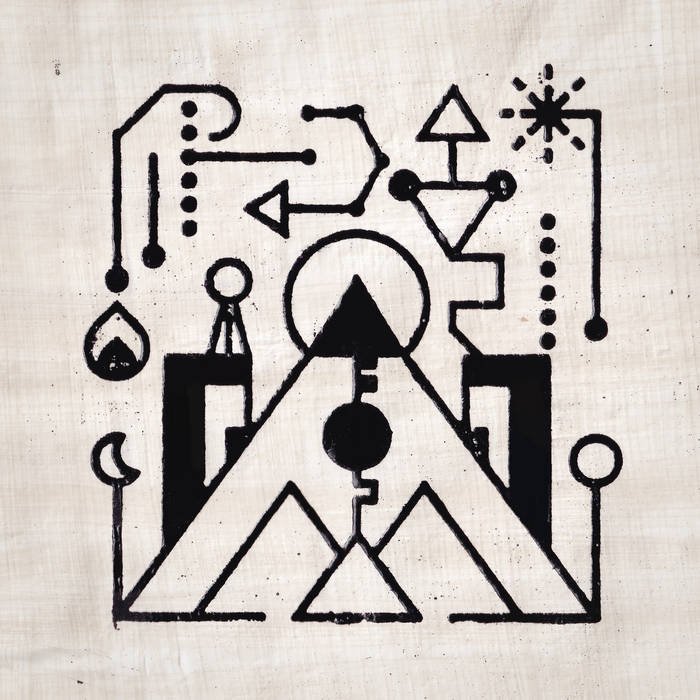
Kero Kero Bonito - Civilisation
Lola Nedic ('22)
Editor-in-Chief
On their fourth studio LP, Kero Kero Bonito fleshes out a more sophisticated version of their signature bouncy pop sound. Don’t get me wrong—the album is still recognizably Kero Kero Bonito. It still boasts the same twirling synths and Sarah Bonito’s cartoonishly high voice, but unlike the band’s previous albums, Civilisation pairs much darker themes with a familiar sound. And though the album is a lot more pessimistic than KKB’s previous works, I can’t help but admire how well-timed the release of this record was.
At only seven songs and 27 minutes, the album has surprisingly little time to address a heavy theme: the fate of humanity. Nevertheless, the album turned out to be poignant and concise, hitting all the major issues and tying them up with a neat little bow at the end. Civilisation opens with “Battle Lines,” a rallying cry in the name of climate change. The song is thoroughly lush and layered, mirroring the complexity of the situation Kero Kero Bonito is trying to bring light to. The rest of the album is apocalypse-core at its finest—tracks like “When the Fires Come” and “Well Rested” dive deep into climate change and the human condition, while “The River” is a thank you letter to mother earth. In the middle of the album is “The Princess and the Clock,” an experiment in storytelling that tells a uniquely captivating fairytale. The track reminds us that even during the ascension, there is still beauty to be found in humanity.
Civilisation seeks to bring light to the often overlooked aspects of human life, both good and bad. The album is paradoxical in and of itself—it’s lighthearted yet apocalyptic, poetic yet daft. The audience is blessed with upbeat, twisty beats, then immediately snapped back into a harsh reality with macabre lines like “I see blood in my dreams” and “humanity is not worth existence.” It’s simultaneously defeatist and hopeful, the perfect headfuck of an album to come out of 2021. Civilisation is a breath of fresh air in an otherwise polluted world.

St. Vincent - Daddy's Home
Michael Cambron ('22)
Managing Editor
Annie Clark has never been one for nostalgia. At least that was the case until the release of her most recent LP as St. Vincent, Daddy’s Home. Trading in the neon dominatrix madhouse for sepia-toned leather chairs, exchanging her sleek black bob for a dirty blonde wig, St. Vincent’s latest takes inspiration from funk a la Sly and the Family Stone, New York City in the early 1970s, and her father’s recent release from prison. With yet another sonic and aesthetic curveball, Clark has delivered one of her most cohesive and arresting projects to date.
Opener and lead single “Pay Your Way In Pain” kicks the album off with a bang. Described as “blues for the 21st century” by Clark herself, it’s hard not to relate to its protagonist stumbling her way through life, hoping that her mundane suffering is all worth it. Though fraying at the seams, the song is held together by an absolutely grimey synthetic bassline, embellished by guitar stabs, backing vocals from the trio of Sy Smith, Nayanna Holley, and Neka Hamilton (whose performances permeate and elevate most of the record), and a lead vocal that sees Clark wailing through one of her most passionate vocal performances yet. “Down,” one of the other more upbeat tracks on the record, is a funky revenge fantasy containing more of Clark’s excellent guitar work.
Though Daddy’s Home wears its influences on cigarette-burnt sleeves, it’s never swallowed by them. The slinky sitar of “Down and Out Downtown” and the washed-out saxophone of the hilariously pervy title track use these embellishments to evoke the era of the early 70s while sounding distinctly like St. Vincent songs. “The Melting of the Sun” sees Clark name-dropping Joni Mitchell, Nina Simone, Tori Amos, and a myriad of other women that broke barriers and suffered at the hands of patriarchy and capitalism for the sake of their art. “My Baby Wants a Baby” takes Sheena Easton’s earnest ode to housewifery “9 to 5” and flips it into an existential crisis in which Clark still faces scrutiny for failing to meet certain standards of femininity.
Where Daddy’s Home really shines, though, is in its slower moments. The finger-picked “Somebody Like Me,” sees Clark framing loving someone as a mutually agreed-upon delusion, a framing that for some god forsaken reason comes off as incredibly sweet. “...At the Holiday Party” is an absolute stunner. Starting hushed and acoustic, Clark describes how it feels to watch helplessly as a loved one struggles with addiction. In lieu of sounding judgemental or patronizing, the song blossoms into a gentle swaying number bolstered by a soft horn section. It’s the warmest and inviting St. Vincent has ever sounded. For a hellish year like 2021, that’s the kind of St. Vincent I needed to hear.
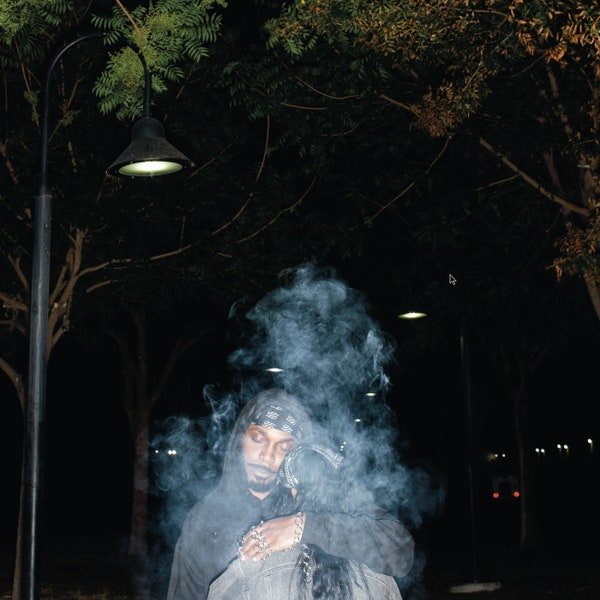
JPEGMAFIA - LP!
Andrés López ('24)
Editor
A defiant and in-your-face masterpiece, JPEGMAFIA’s LP! is easily the album of the year. As I listened to the “offline” version of LP! with my friends, no tracks had to grow on me, as from the very first listen, I knew that Peggy had something special with this one. He masterfully blends experimental and traditional elements of rap to create an incredibly consistent album with a variety of sounds. From front to back, the album is filled with both aggressive bangers and laid-back bops alike. Peggy’s production is front and center, with inventive electronic beats serving as the perfect soundscape for his incredible rapping. His flow throughout the album is unmatched, taking a new and exciting direction every track. Lyrically, Peggy is as sharp as ever, with witty one liners, social commentary, braggadocio, basketball references, and humorous bars all coming together to construct a stellar tracklist. Highlights such as “HAZARD DUTY PAY!,” “REBOUND!,” and “THOT’S PRAYER!” among others show why Peggy is the vanguard of modern rap. From impeccable sampling to blaring horns to an interpolation of Britney Spears, LP! is nothing short of unpredictable and imaginative. There are simply no misses on this album. Any fan of hip hop should give this album a listen regardless of their favorite subgenre, as it is simply too good to miss out on.

Navy Blue - Navy's Reprise
Spencer Vernier ('25)
Social Media
On Navy’s Reprise, Sage Elsesser, better known as Navy Blue, reaches the culmination of what he had been building up to on his excellent 2020 releases, Àdá Irin and Song of Sage: Post Panic! A sixteen-song LP with a runtime of a little over 39 minutes, his 2021 album is a pure stunner. Listening to Elsesser feels as if the words are all falling out of him effortlessly, his flow holding both the gentle and the devastating. With instrumentals that provide a gorgeous complement to Navy’s rhymes, Navy’s Reprise is all-consuming and fully absorbs the listener in its contemplative, uncertain, and immensely human story. “Damn the heroism Navy just another soul / A special spirit, blessings near wherever he go / My memory froze carve the tap of the stone / Charms a marrowless bone, scorn to reap what I’ve sown / There’s more of me to atone,” he raps on “God’s Magnetic Pull.” On this endlessly praise-worthy release, Elsesser bares all, making Navy’s Reprise an utterly personal experience that balances triumph and suffering in the perfect revelation.

Lucy Dacus - Home Video
Olivia Bello ('25)
Lucy Dacus’ sophomore album, Home Video, is aptly titled, as Dacus’ songs paint a palpable portrait of childhood nostalgia. The track titles “Cartwheel,” “Partner in Crime,” and “Triple Dog Dare” bring me right back to my elementary school playground. Enveloped in comforting instrumentals, Dacus’ lyrics create more nostalgic images: “screened in door” (“First Time”), “cracked blacktop curling up,” (“Cartwheel”), “locking lips and braces brackets” (“Going, Going, Gone”), and “eating cherries on the bridge” (“Partner in Crime”). In “Hot & Heavy,” she sings about the stifling yet familiar feeling of revisiting an old place and an old relationship: “It’s bittersweet to see you again.”
An aspect of Home Video that tugs at my heart is the sweet platonic love that saturates Dacus’ songs. She sings about the little moments with her friends, a sleepy head on her shoulder in “Christine,” a hand grasped tightly in “Thumbs.” In these two songs in particular, along with “Please Stay,” Dacus shares the intense care she has for her friends with the listener. In “Thumbs,” she wants to help her friend so badly that she is willing to kill their abusive father, and in “Please Stay,” she begs, “Call me if you need a friend or never talk to me again / but please stay.” Every time I hear Dacus’ voice, I imagine what an incredible friend she must be, how I want someone like her in my life, and how I would like to be that person for someone else. Especially since entering college, I have met so many people that have suffered unimaginable hardships, and like Lucy Dacus, I wish I could take their pain away.

Black Country, New Road - For the first time
Isaac Dame ('25)
2021 has been an undeniably fantastic year for the surging post-punk genre, with bands such as Squid and Shame producing strong album of the year contenders. However, none struck me as being as innovative or moving as For the first time by Black Country, New Road. BCNR are grounded in other post-punk bands that incorporate prog and jazz, such as Slint and black midi (a fact lead singer Isaac Wood openly references in his lyrics.) However, to dismiss this septet as ripoffs would be to ignore their incredible talent which is on constant display across all six songs off For the first time.
While it is easy to think of Wood’s dramatic and energetic displays as forming the heart of the band, to me the instrumental backdrop is what makes BCNR special. Each piece is noticeable, noisy, and fast, but they all fit within their roles and contribute to one cohesive whole, as best shown on the intro track “Instrumental” and the last minute of “Athens, France.” This cohesive whole is not a calming steady force but more of a constantly shifting, frenetic entity, always anxiously building to an eruption. This intensity only makes the cohesiveness of For the first time even more impressive.
This year was one where I had to deal with a lot of new beginnings and uncertainties of my own, many not seeming to make sense. For the first time reflected my anxiety back in an honest and beautiful form. This album is a feat of organized chaos, my 2021 album of the year and one of the best debut albums ever.
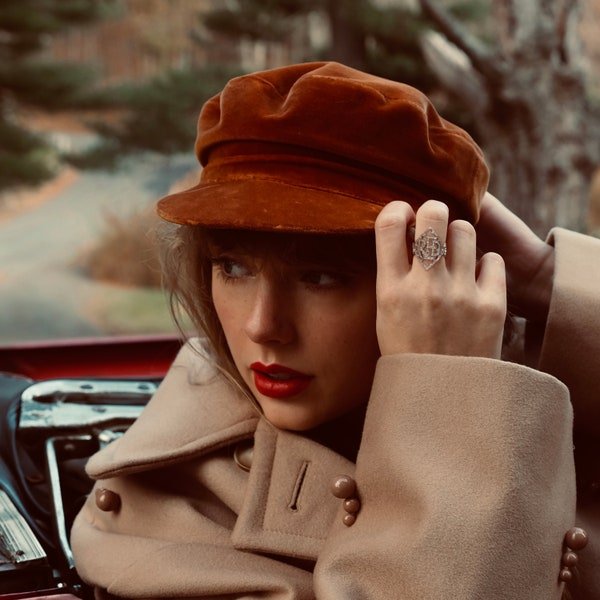
Taylor Swift - Red (Taylor's Version)
Katelyn Desjardins ('23)
Taylor Swift was the first artist I ever went out of my way to listen to. From sitting in the back of my Mom’s minivan at 8 years old begging to listen to the Fearless CD instead of the radio to laying in bed in my college apartment taking in the All Too Well 10 minute version for the first time, Taylor Swift has provided a soundtrack for over half of my life. For a bit of time in middle and high school I stopped listening to Taylor Swift as much; I was afraid of being basic and wanted all of my interests and tastes to align with some sort of mysterious edgy manic pixie dream girl image. I’m incredibly grateful that Red (Taylor’s Version) was released at a time when I didn’t feel the need to pretend it wasn’t one of my favorite albums of the year.
When Red was first released I was 11 years old, I loved dancing around my kitchen to songs like Stay Stay Stay and Starlight. After a particularly bad day of 6th grade I may have gone to my iPod Nano and blasted All Too Well or The Last Time through my headphones, but I ultimately was unable to feel much of an emotional connection to the music. I loved it, but I couldn’t relate to the lyrics in a lasting way. Foolishly, I assumed that I would have a similar experience with Red (Taylor’s Version). I was excited to hear new versions of some old songs, even though Red had never been my favorite Taylor Swift album, instead thinking I would listen to the album a few times, enjoy it, and go back to listening to folklore and evermore on repeat. I could not have been more wrong.
At around 12:30 AM on November 12th, 2021, I realized Red (Taylor’s Version) had been released. I was looking forward to listening to it but it somehow slipped my mind right at midnight. I got ready for bed, laid down, and started listening to the album in order, but by the time I got to I Knew You Were Trouble I couldn’t hold myself back from listening to the 10 minute version of All Too Well. I was blown away. In my opinion, folklore and evermore exemplified Swifts ability to tell stories through her lyrics - however, All Too Well (10 Minute Version) (Taylor’s Version) (From The Vault) and its accompanying short film proves that she has held those impressive songwriting skills since at least 2012. If a song can hold my full undivided attention for 10 minutes straight while prompting thoughts like “wow I really hope I have a whirlwind romance that ends in me being brutally dumped soon so that I can relate to lyrics like ‘you kept me like a secret, but I kept you like an oath’ and ‘just between us, did the love affair maim you all too well?’ with a real passion,” I feel that it deserves some praise.
I don’t know if I would have classified the original Red as my album of 2012, but now lyrics like “The idea you had of me, who was she?/ A never-needy, ever-lovely jewel whose shine reflects on you,” “How long will this be cute? All this crying in my room,” ''How did I go from growing up to breaking down,” and “I don’t have to be your shrink to know you’ll never be happy” all have the power to hit me like a ton of bricks. Red (Taylor’s Version) has quickly become my favorite sad girl album of 2021.
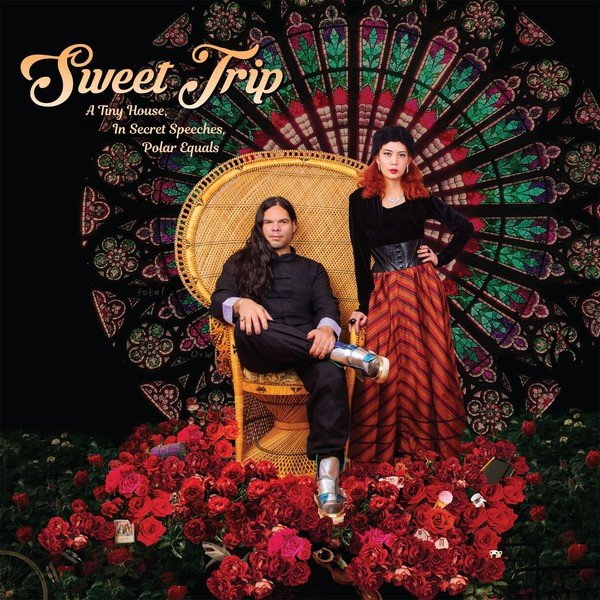
Sweet Trip - A Tiny House, in Secret Speeches, Polar Equals
Jason Evers ('23)
My favorite thing about Sweet Trip is how they go at their own pace. The duo doesn’t conform to the whims of labels or demands of fans – that’s how you know they’re in it for the sake of the art. They’ve always taken somewhat long hiatuses between releases; they first debuted in the indietronica scene in 1998 with Halica, followed by a five-year gap until 2003’s Velocity: Design: Comfort. It seemed as though the duo had all but disappeared until they released their third record, You Will Never Know Why, 6 years later in 2009. And then, radio silence.
I got into Sweet Trip at the start of the pandemic last March. Valerie Cooper’s ethereal whispers over Roby Burgos’ mysterious digital soundscapes provided comfort during one of the most uncomfortable periods of my life. I felt pretty lucky to have gotten into Sweet Trip when I did, because it seemed as though the group was just about ready to make a comeback right when I started listening to them. I was lucky enough to not have to suffer through the decade-long wait for a new Sweet Trip album; I was dropped in at the perfect time to become a new fan.
It was pretty easy to sense that Roby and Valerie were ready to step back into the music world once again. January 2021 came with the stellar release of “Walkers Beware! We Drive into the Sun,” a smooth, blissed-out single from their upcoming LP: A Tiny House, in Secret Speeches, Polar Equals. The rest of my sophomore year was spent forcing my friends to listen to “Walkers Beware!” as we awaited the summer’s approach. A Tiny House was somewhat of a birthday present to me. It was released on May 28th, 2021, a week after my birthday, on a morning I spent inside a shipping truck at my town’s local HomeGoods. Loading boxes onto the conveyor that morning wasn’t so bad with new sounds from Roby and Valerie to ward off the monotony of my part-time retail job. In fact, my shift that morning was actually pretty fun. A Tiny House feels like a perfect mix between Sweet Trip’s two seminal releases: some tracks boast the glitchy static-shock of Velocity: Design: Comfort, while others preserve the playful pop structures of You Will Never Know Why, with many blending the best elements of both.
My favorite track off of A Tiny House is one that I think doesn’t get the recognition it deserves. “In Sound, We Found Each Other” serves not only as a life-loving, impassioned bridge between Sweet Trip’s electronic and indie pop styles, but also a look into the core of why the duo exists at all. Roby Burgos and Valerie Cooper found each other in their shared love of music, and their relationship has conjured swathes of new music lovers who got into music through Sweet Trip.
When Valerie and Roby’s duet kicks in halfway through the track, I’m reminded of the freeway that stretches between my town in central Jersey and the shore, how my friends and I belted out chorus after chorus on our way to Atlantic City. I’m reminded of how even when my friends and I have nothing more to say, there will always be music to fill the silence. In sound, we found each other. In sound, who else might we find?

Black Dresses - Forever In Your Heart
Leo I.M. ('23)
The noise-pop duo Black Dresses emerged, after having broken up mid-2020, in February of this year to drop Forever In Your Heart, an album which takes the bottomless misery of the COVID era and asks, on its opening track, whether we can “make something beautiful with no hope.” The answer, if the album is to be taken as evidence, would seem to be a resounding yes. On this record, Black Dresses crank up the hysteria and use imagery of literal, earth-on-fire apocalypse alongside lockdown neuroticism, which synthesize together to form a profound figuration of the cloistered terror of life under late-disaster-capitalism.
Forever In Your Heart’s boundless generosity is its greatest asset, and is what allows the album to plunge the listener into such bleak subject matter without coming off as exhausting or dully nihilistic. Though the subject matter is fairly 2020-core, Black Dresses keep the drudgery squarely within the album’s diegesis, and it never bleeds over to become the substance of the tracks themselves. The group’s pop sensibilities are so finely honed, and the hooks come at you at such a blistering pace, that when listening to the album, one can’t help but feel excitement, even as the lyrics cut deep with proclamations of unending despair and horror at the state of the world.
The production across the album is a tour de force of industrial music, with drums that redefine distortion and synth arrangements which feel both brutal and uncannily alive. The record combines rock and hip hop instrumentation to create a claustrophobic and oppressive atmosphere (think late-era Def Jux crossed with Sleigh Bells’ first album) where the listener can never be sure if they feel compelled to dance along because the tracks slap, or because they’re undergoing a fight-or-flight response. Texturally, it is a thoroughly cyborg album. Vocal fry and autotune warbles intermingle to the point of becoming indistinguishable, chugging guitars blend with glitched out synths, and gutturals mix with “actual” noise. On the track “waiting42moro” the lyric “white noise kinda drown me out” is paired with the noisy burble of MP3 compression pushed beyond its limits. The total effect of these transgressions between instrument and voice and between digital and organic is a collapsed sense of body and machine, where saw waves feel like saw blades as the screaming electronics and shredding guitars threaten to tear the screams of the singers underneath them to shreds.
Buried amid all this violence, however, is a great deal of beauty and hope. Even as the album’s title serves as a double entendre, framed as long-COVID nightmare by the lyric “it could live forever in your heart,” there is heart to be found here, and the album’s search for beauty, even in a world which seems supernaturally keen on stamping it out, is deeply affecting. Even as the closing track “(Can’t) Keep It Together” ends the album’s search for a meaningful existence under late capitalism in emotional collapse, there is peace and beauty to be found in having collapsed, and Black Dresses’ apocalypse-bricolage is one of the finest expressions of that beauty.

Schwey - Schwey 2: Cyber Soul
Donovan Menard ('23)
I know just what you’re thinking: “I wanna go on a flying boat ride through a colorful tunnel while receiving occasional slaps in the face with shiny and hefty cylinders! And I want it NOW!!” Well boy, do I have the album for you, pal – look no further than Schwey’s 2021 release Schwey 2: Cyber Soul! With this album, Schwey serves up a delectable concoction of funk, soul, and house that WILL compel you to move around in spontaneous and unreasonable ways. Sounds are impressively textured throughout this album, with groovy bass lines layered over crisp percussion with entrancing keyboard parts and echoey, psychedelic sound effects. It hits the spot. It scratches a lot of itches. It snaps! It crackles! It pops! Hell, I would even go so far as to describe it as hoinky-zoinky! “What does that mean???” you ask… it means EXACTLY what it SOUNDS like it means, damnit!!!
The first half of Cyber Soul is a bit more laid-back and relaxing than the latter portion. “Who Says” is a highlight of this lazy river-esque beginning of the album. Right past the halfway point is one of my favorite songs from the album, “Something I Know’s I’ve Got to Change” which starts out like a gentle breeze and gradually picks up the pace as it morphs into a layered and danceable journey that doesn’t stop (and you won’t want it to!) Listening to this song with your eyes closed will make you feel like Remi in that scene in Ratatouille when he eats a strawberry with cheese simultaneously and then a bunch of colorful light patterns appear in his mind. It’s like that, but for FIVE MINUTES! The following song, “Sweat,” is guaranteed to knock your socks clean off. The percussion and bass give the song a compelling drive, while the keyboard part gushes forth with its thick and constantly changes tone. My favorite part is the outro, in which the bass line takes on a heavy, dense and shifting texture, mixing with a percussion rhythm that will make you jump both up AND down! Repeatedly! If social conventions prevent you from jumping up and down physically, you WILL do so in the spiritual realm.
Overall, Schwey 2: Cyber Soul is fun, futuristic, funky, and colorful. I’m not recommending that you listen to this album, I am COMMANDING you to do so. Now, FOLLOW MY ORDERS! PRONTO! You have no time to lose!!
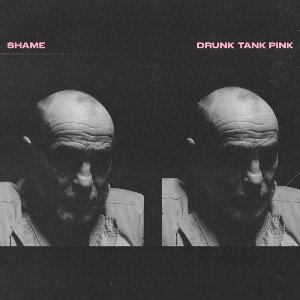
Shame - Drunk Tank Pink
Lucy Millman ('24)
Post-punk is my favorite music genre, but I really have no clue what it is. Sure, I have a general idea, and I know what it isn’t, but the parameters are loose at best. Shame’s 2021 release Drunk Tank Pink is so much of what I love most about this genre I can only kind of explain. Explained in one word, this album is misanthropic. It’s a deep dive of anger, self-pity, and angst, completed with loud enraged vocals and sharp guitar riffs. However, it’s never excessive in its misanthropic qualities, nor does it ever feel too angsty. It feels very earnest and surprisingly personal for something that comes off as quite angry upon listening. The album title itself is a reference to the name of the color that shame’s frontman Charlie Steen painted his room, a shade of pink known to reduce aggressive behavior. In that same sense, I see this album in the same light: it’s not necessarily meant to exacerbate anger and self-pity and all these negative qualities, but in creating this honest display of emotion, it’s meant to be weirdly calming and cathartic.
This surprising charm and sincerity is present continuously in the album. The opening song “Alphabet,” poses a direct question to the shame’s listeners, asking if anything the band creates will ever be enough to provide satisfaction, but whether they’re talking about their own satisfaction or that of the audience is left unclear. In “6/1,” the ninth track on the album, Steen explores his own oxymoronic combination of self-hate and narcissism, opening the song with “I represent everything that I hate / Yet I'm the person I always dreamt I could become” and closing the song with “And I hate myself but I love myself.” The seventh track may be the most honest and humbling. Sandwiched between the theatrical and transcendent “Snow Day,” which feels like a four act play, and the short and noisy “Great Dog,” “Human, for a Minute” is surprisingly slow, with most of the lyrics delivered by an (almost scarily) calm Steen. In the most deprecating but matter of fact way, he sings “I'm half the man I should be” and “I never felt human before you arrived.” It’s devastating, but absolutely beautiful at the same time.
This album has it all. It’s full of surprising references (Elton John, Shakespeare, and Roald Dahl, to name a few), sharp and clever riffs, and incredibly honest lyrics. I still don’t know how to define post-punk. When I’m trying to make it easiest for people completely unfamiliar with the genre, I usually point them in the direction of a Joy Division or Gang of Four album. But the next time I’m asked, I may just have to include Drunk Tank Pink in that line up.

Floating Points, Pharaoh Sanders, London Symphony Orchestra - Promises
Jackson Rhodes ('22)
It’s easy to wax poetic about Promises. Floating Points, the album’s composer, builds a mesmeric foundation with the London Symphony Orchestra and his own electronic instrumentation, ebbing with silence and sublime production. Pharoah Sanders, a monolith of the free jazz movement in the 1960s, adds to that structure with masterfully restrained yet soulful improvisations.
Built from a single motif, the album’s nine movements flow effortlessly in an ambient, dream-like trance of serenity and drama, as minimal as it is explosive. The organic nature of the music is reflected in its creation. Sanders had listened to and enjoyed the music of Sam Shepherd, known under the moniker of Floating Points, and arranged a meeting in 2015. Despite the 40-year age difference between them, the artists formed a friendship, agreed to create an album together, and commissioned the London Symphony Orchestra to further enhance their shared vision. There’s a timelessness to the music they eventually created, perhaps due to the artist’s disparate backgrounds, where a mutual understanding is found in their commitment to crafting and expressing sheer beauty. The sparkling, surprisingly catchy theme played throughout by Shepherd feels very much like “floating points” itself, met with supreme saxophone playing by Sanders and ineffable grandeur of the orchestra.
This music is transcendent, revelatory, cinematic, spiritual, seamless, meditative, cosmic, mutating, formless, weightless, mercurial, and majestic; There are so many words including these to describe the loveliness of this album that all of them feel arbitrary. Promises mutates and transcends as though it were alive, filled with a life eternal. And based on what you’ve just read, I think I should amend my previous statement. It’s very easy to wax poetic about Promises.

Mia Ariannaa - I'm A Good Girl..... Do You Believe Me?
Daniel Schwartz ('24)
While relaxing in my backyard under the summer sun, I had the idea to do something that I’d never done before - I decided to listen to an algorithm-recommended album from my Spotify homepage with no prior knowledge of the album or artist. As soon as the first song started, I had the simple thought of “I need to do this more often.”
Mia Ariannaa’s I’m A Good Girl….. Do You Believe Me? is as bold and racy as its title suggests. The debut R&B EP from Mia explores the realities of fake friends (“F.A.B.”), regrettable exes (“What Was I Thinking?”), sexual fantasies (“T.A.G.”), and jealousy so intense it becomes violent (“S.T.M.F.U.”). Clearly, Mia doesn’t hold back.
She cleverly utilizes her ability to go back and forth between singing, with harmonies and a smoothness reminiscent of Summer Walker, and rapping to help express a range of emotion and intensity in her songs. This album is upbeat and fiery enough to blast in the car and shout along to, but also easy enough on the ears that it can be the perfect soundtrack for your backyard summer relaxing.

